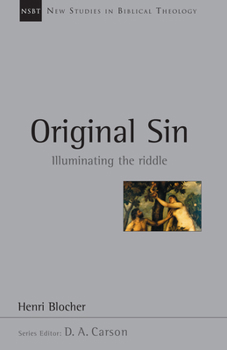Original Sin: Illuminating the Riddle Volume 5
(Book #5 in the New Studies in Biblical Theology Series)
We live in a world shot through with evil. The twentieth century has witnessed suffering and human cruelty on a scale never before imagined. Yet, paradoxically, in recent years the doctrine of original sin has suffered neglect and ridicule. In this philosophically sophisticated treatment of the biblical evidence for original sin, Henri Blocher offers a robust response. Interacting with the best theological thinking on the subject, this New Studies...
Format:Paperback
Language:English
ISBN:083082605X
ISBN13:9780830826056
Release Date:October 2000
Publisher:IVP Academic
Length:158 Pages
Weight:0.50 lbs.
Dimensions:0.4" x 6.4" x 9.0"
Customer Reviews
2 ratings
One of the best books on original sin
Published by Thriftbooks.com User , 21 years ago
I read this book in conjunction with John Murray's book, The Imputation of Adam's Sin. I believe Blocher's book to be the stronger and more convincing of the two since Murray's work is older and is only designed to account for the classic Reformed position. The strength of Blocher's work lies in the fact that it attempts to discuss multiple treatments on the issue of original sin, and give the strengths and weaknesses of each side. I also believe, like Blocher, that a correct understanding of original sin is vital to a correct understanding of the human condition, our sinfulness, and our need for salvation and redemption.The chapter I enjoyed the most was Blocher's treatment of Romans 5. He believes that there are two main schools of thought that have attempted to understand this passage. One school, that of a looser interpretation, likes to be very flexible in how it views Adam's relation to Christ's. The other school, that of a stricter interpretation, likes to view Adam's relation to Christ as extremely similar. Blocher says the school of looser interpretation is more Pelagian, while the school of strict interpretation is more Augustinian in it's mindset.I believe that Blocher deals fairly with both sides assessing their respective strengths and weaknesses. When it comes to the school of a looser interpretation, Blocher notes that they are staunch defenders of individual responsibility for sin, and recognize the disatrous consequeces that can occur when one believes in inherited guilt(for instance Augustine's insistence that unbaptized children are damned to hell because they are born guilty). Nevertheless, their view that Paul is speaking merely of a source or fountainhead of unrighteousness in this passage just doesn't make sense since Paul seems to attribute so much to Adam's disobedience.As for the stricter school, Blocher notes that their view is more coherent and makes better sense of the text, but is not immune from criticism. First, Paul's focus on the people from Adam to Moses is not easily accounted for under the strict view. Blocher shows how many exegetes have attempted to refute Paul by saying there was law in effect at that time, which clearly shows they believe Paul didn't know what he was talking about. Also, Blocher realizes that Scripture does set a precedent for ackowledging that an individual can suffer the consequences for another's sin and not be personally guilty of that sin. He uses the example of David in 2 Samuel 24 as an example. Individuals from the strict school assert that to suffer the consequences of one's sin without the guilt, is just as unjust as to be guilty of one's sin when one is personally not guilty. I, along with Blocher, seriously question the validity of this statement, especailly since this principle is such a regular part of our everyday experience.Finally, I believe Blocher's chapter on Original Sin as the key to the human experience to be excellent. Without the doctrine of origina
Challenging and thought provoking look at an old idea
Published by Thriftbooks.com User , 24 years ago
Friends who attended the lectures from which this book was written recommended it to me, and I'm glad they did. Original sin is and, as Blocher points out, has long been a controversial part of church teaching. While we might recognise that many evil deeds take place in our world, we are often reticent to label people as sinful from birth. If we are to do that, the way in which our sinful nature might be passed on is also difficult to fathom. Blocher begins with both a philosophical and a scriptural overview of the doctrine, before focussing in on the Genesis narrative and then Romans 5, the passages which, he argues, have most to say on the subject. He then moves back out to look at evil in the world and the way that the doctrine of original sin sheds light on the human predicament. This leads into a discussion of the transmission of the sinful nature and the proper response to the recognition of it. Blocher's work is obviously scholarly, yet a surprisingly easy read despite that. His `take' on Romans 5 requires more thought on behalf of this reader, but seems both convincing and helpful. Best of all, it encourages us to look again at the doctrine of original sin, while remaining focussed on the necessity for repentance and focus upon the work of Christ in the Christian life. This is a book well worth having in the library of a thinking Christian.






